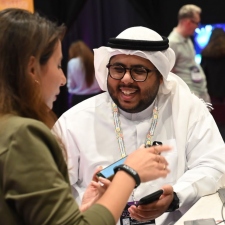Last week, the GameExpo Summit was successfully held in Dubai under the auspices of Pocket Gamer Connects as part of our international conference series.
The event served as an exclusive platform for knowledge exchange and networking among professionals in the games industry, complemented by the GameExpo esports festival next door.
Boasting an impressive turnout of over 1,300 registered attendees, the gathering emerged as a global focal point for industry insiders, extending beyond the MENA region. From June 21 to 22, the inaugural Summit witnessed the contributions of nearly 100 experts, who shared their insights.
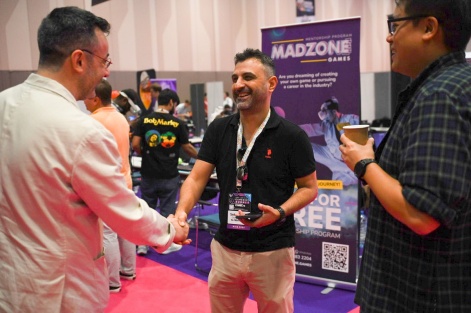
If you weren't able to join us this time, here are key moments you missed on the second day (find the first day here):
The past and future of interactive broadcasts
On day two, an early highlight on the Developer Toolkit track was Alex Casassovici (CEO & founder, Azarus.io) discussing interactive TV. He took us on a historical journey starting with the eight million viewers watching The Wheel Of Fortune in the 1980s when it was possible to take part from home with a peripheral you could buy in stores.
To this day, TV still draws more attention than other devices (MarketingCharts.com, July 2019), and top sporting events like the Super Bowl can still draw in 100 million viewers.
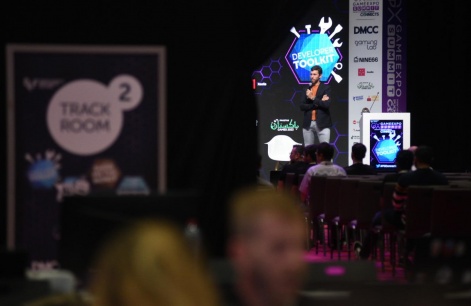
With TVs becoming more and more like interacting services (he drew attention to shows like Black Mirror: Bandersnatch and Love, Death & Robots, which had blockchain code hidden in one episode). “It’s no longer a TV, even though we still call it that,” he said. “Every screen is now an internet video player, and every internet video player can run games natively.”
Azarus has a platform to manage and reward viewers who interact, and its Twitch integration has 80 million people clicking the button on the screen during streams, such as Logitech and Red Bull interactive games.
AI, prototyping and esports: the future of gaming
As in all our recent events, generative AI was a hot topic. Wayne Lee from Bloxmoth has worked in the games industry for years, including household names like Blizzard and Riot but confessed, “In all my years, I never saw as big a change as AI. People know it’s going to be big, but they don’t realise how big!”
He predicted that planning would still be the role of human creatives. “Exactly how the game is going to flow and be fun, that’s still in your head,” he said, but stressed that pre-production, production, and testing will all be massively impacted by AI in the short term.
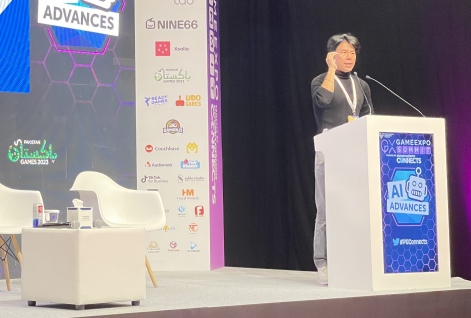
He drew the crowd’s attention to tools, including the cutting edge of game coding. “The latest version of FRVR is able to do game development by you simply speaking to it – it’ll build a prototype based on your description.” He also recommended Leonardo as the best AI concept art tool.
He mentioned one practical business idea: there is a “black hole” in esports and AI right now. “If you’re looking to start an AI initiative, esports might be the place to do it.”
AI’s impact on marketing, law and game design
The conference also witnessed talks by AppAgent’s Peter Fodor advising on using AI in marketing and Jonty Cowan from Wiggin LLP on current law. Cowan described “the arms race in legal AI” and gave the audience plenty to think about regarding AI in the workplace.
He asked, “Who owns what is input and output from the tool?” Drawing attention to the Getty Images case, he made the audience think about whether they have properly licenced the data their work is based on.
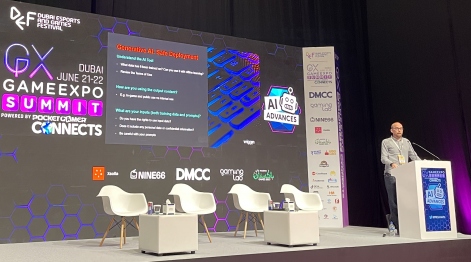
And even the act of prompting should be considered in terms of whether you’re asking a legitimate question. “If you ask the tool to draw a picture of Mario,” he said, “It will be argued [in court] that you were instructing the tool to infringe IP.”
There’s also the question of whether or not you have rights in the machine-generated art (it varies from territory to territory). So “make sure you read the terms of use carefully!” Most tool makers will give you “no guarantees, warranties or indemnities about what’s created by the tool.”
You should also contemplate the use of personal data. Some AI tools will add what you upload to their data set. It’s doubtful that you’ve got permission from others to upload their information, so don’t use certain tools to crunch contact data unless you have consent to do that. And for goodness’ sake, “Don’t put your source code in there; you are very likely licensing that to them!”
If you embrace AI in the workplace, your company should have a policy on it – it doesn’t have to be prohibitive; it could be a list of things you are allowed to do with it. AI is here to stay, so it’s a good idea to have a set of workplace guidelines similar to your social media use policy.
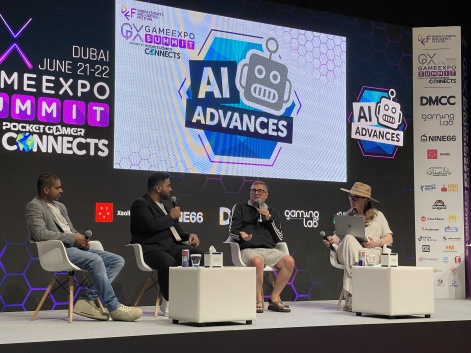
A panel hosted by Jacki Vause of Dimoso was up next on a similar theme: “Exploring the Impact & Potential of AI in Game Development.” The discussion covered everything from what we mean by AI to how it can be used to repaint car models quickly and make NPCs cleverer.
Last year, 50% of our pitch decks were about web3. This year they’re about AI, but they rely on third-party technology holdersMaria Kochmola, The Games Fund
The panel warned about looking out for so-called hallucinations – Oz Syed (Sauce Labs) shared an example of using ChatGPT to write a Unity function that will detect renamed assets; it’s something, in theory, ChatGPT can do, but the supplied function didn’t work. “There is so much that’s inaccurate,” warned Vause.
Investment strategies in gaming
On the popular “Show Me the Money” track, our own Chris James presented the audience with a summary of the investment scene, then hosted a panel with Pieter Van der Pijl (Triple Dragon), Maria Kochmola (The Games Fund), Anuj Tandon (JetSynthesys) and Paul Dawalibi (Holodeck Ventures).
“Despite some microeconomic turbulence and challenges like IDFA, I still believe investment in video games is a very attractive business,” said Kochmola describing herself as bullish.
Tandon went further: “This is the best time to buy studios!”
The panel touched on mobile, blockchain, VR and AI. Dawalibi (whose nickname is Paul the Profit) spoke about how venture capitalists chase the latest thing every couple of years: “Eventually, the dumb money gets filtered out. I think there’s still a lot of dumb money in gaming!” Of all the panellists, he was most down on mobile, instead favouring PC.
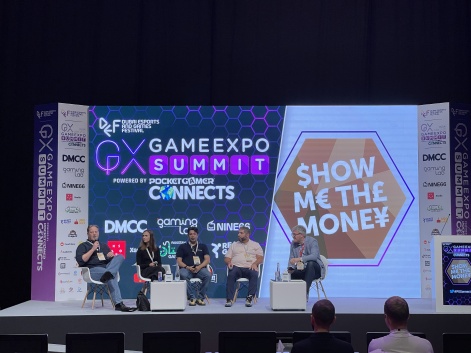
Kochmola also commented on the rise of AI: “Last year, 50% of our pitch decks were about web3. This year they’re all about AI – but they rely a lot on the third-party technology holders, and my question is, how dependable are those platforms?” Instead, she, too, said PC, especially with solid IP, was worth looking at.
Pieter Van der Pijl still believes in mobile, despite recent challenges, including the post-IDFA changes around data.
There’s no gender in coding, there’s no gender in art. But maybe historically women had less opportunity to learnCharly Harbord, Global Game Jam
“We have found developers finding ways to work, perhaps using automation processes to speed up UA," he said. "If you’re smart, you can find ways to get to a level of efficiency; perhaps not the same as pre-IDFA, but it’s getting there. We still believe in mobile, and teams can use guerilla and alternative ways to do marketing and attract users.”
“Go local” was also good advice. Tandon pointed out that “starting a mobile dev studio now, getting funding in an established market will be super tough if you don’t have a pedigree”. However, he spoke about the attraction of local studios developing for a local audience. With that in mind, Tandon encouraged us to keep an eye on the emerging markets in the world and watch out for regional opportunities.
Diversity and inclusion in global games
Ending the conference, we were treated to a panel about diversity and inclusion in the workplace. Maysalward’s Nour Khrais was the host, and he posed questions about issues such as disabilities, ageism, gender and more, to Charly Harbord (Global Game Jam) and Tsahi Liberman (Styrax Studios).
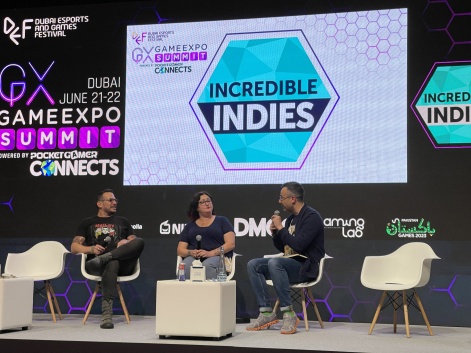
Maysalward, based in Jordan, has 60% female leaders and recently hired its first disabled Unity developer. Liberman is engaged in a project called Games For Peace that connects people in conflict zones worldwide through the language of games.
Harbord meanwhile spoke about her work on the Global Game Jams but stressed “no tokenism”. “You must hire the best person for the job,” she said, with the others agreeing that diversity is not a box-ticking trend and that it’s essential studios do their research. “Do proper representation,” she said, continuing: “There’s no gender in coding, there’s no gender in art. But maybe historically women had less opportunity to learn.”
The panel discussed the need to be mindful of cultural differences in creative work. For instance, giving a white flower or a watch in parts of Asia has a different interpretation than in the West. “If you want to make a game about the Arabian Nights,” said Harbord, “Make sure you talk to people from this region first.”

There were two stages and scores of speakers, so this only serves as a brief overview. You can also read about the first day’s activity, which included more information about the MENA region and esports. Recordings of both days’ sessions will be available on our Video Vault site soon. For more live events like this, please visit https://www.pgconnects.com. The next stop on the Pocket Gamer Connects tour will be Toronto in July. We will return to the Middle East for November’s Jordan conference.

